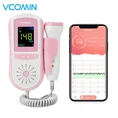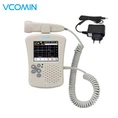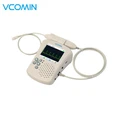In the field of modern medicine, Doppler vascular monitors have become indispensable due to their non-invasive, rapid, and accurate characteristics. By providing real-time monitoring of blood flow velocity and direction, Doppler technology showcases powerful potential across various clinical departments. This article highlights the five key clinical applications of Doppler vascular monitors and their significant value.
1. Diagnosis and Monitoring of Peripheral Artery Disease
Peripheral artery disease (PAD) is a common and serious vascular condition, particularly prevalent among the elderly and diabetic patients. Using a Doppler vascular monitor to measure blood flow velocity, physicians can accurately assess the degree of arterial narrowing or blockage.
The advent of portable Doppler vascular monitors enables bedside evaluations, especially in emergency settings and primary care facilities, facilitating rapid vascular assessments and helping to determine whether surgical interventions or intensified medical treatments are necessary.
2. Monitoring of Hemodialysis Access
For patients undergoing long-term hemodialysis, maintaining the patency of arteriovenous fistulas (AVF) or grafts is crucial. Clinically, blood flow detectors are used to monitor real-time flow through vascular access, enabling early detection of stenosis or occlusions.
Regular assessments with vascular Doppler devices can significantly extend access life spans and reduce complications, thereby improving the quality of life for dialysis patients.
3. Screening for Deep Vein Thrombosis (DVT)
Deep vein thrombosis (DVT) is a leading cause of pulmonary embolism and carries a high mortality risk. Although traditional imaging methods like CT angiography are accurate, they are costly and invasive.
By employing portable Doppler vascular monitors to measure venous blood flow in the lower limbs, clinicians can conduct non-invasive, rapid DVT screenings, particularly valuable in emergency departments and ICUs where time efficiency is critical.
4. Fetal Monitoring in Obstetrics
In obstetrics, fetal blood flow monitoring plays a vital role in managing high-risk pregnancies. Doppler technology allows for the evaluation of crucial vessels such as the umbilical artery and middle cerebral artery, providing insight into placental function and fetal oxygenation.
A high-quality Doppler vascular monitor enables early detection of fetal distress, allowing timely interventions that greatly enhance maternal and fetal safety outcomes.
5. Evaluation of Blood Flow Recovery in Rehabilitation Medicine
Rehabilitation medicine focuses on restoring function and improving quality of life. For post-operative, trauma, or stroke patients, evaluating blood flow recovery is crucial.
By using a blood flow detector to monitor improvements in microcirculation during rehabilitation, healthcare teams can tailor therapeutic strategies more precisely, facilitating faster and more effective recoveries.

6. Why Choose Vcomin Technology Limited for Your Doppler Vascular Monitor?
Vcomin Technology Limited has specialized in the medical ultrasound field for over 15 years. Our range of Doppler vascular monitors - including portable and desktop models - features premium-quality probes and advanced signal processing technologies, ensuring highly accurate blood flow velocity measurements for clinical excellence.
If you are looking for a durable, high-performance vascular Doppler device, Weikangming is your best choice. Our R&D team continues to innovate, providing medical institutions worldwide with products that meet the highest standards.
Choose Vcomin, where precision monitoring is our lasting promise!




